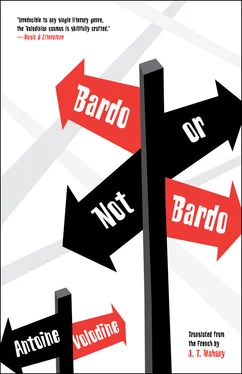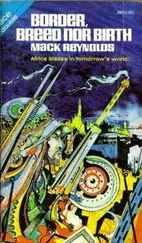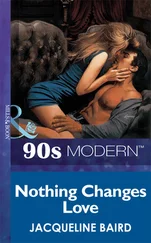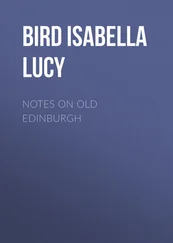“Three days ago, a Tibetan woman got on at Lee Yip Street,” Schlumm said.
“Oh, a Tibetan,” I said.
“A Tibetan woman from the Organization,” Schlumm clarified.
“So?” I said.
“She left,” said Schlumm, “a little before we got to Shek Lung Street. She was looking for a certain Puffky as well. The Organization’s put her on your trail. Her task is to extract information from you.”
“What kind,” I asked.
“Something you didn’t want to give, it would seem.”
Sweat began streaming all over my body, springing up in dozens of places at the same time and quickly spreading to all my folds and smooth surfaces, bathing me from head to toe, chilling me. I shivered.
“Information,” I sputtered. “Information about what.”
“About the seven weeks following death,” said Schlumm.
“Oh, there are many more than that,” I said.
“She was just interested in the first seven,” said Schlumm.
“And she’s gone now?” I asked.
“Yes,” said Schlumm. “As soon as. .”
“As soon as what.”
“As soon as you were done with your revelations,” said Schlumm. “You were talking in your sleep, you know.”
“I have no idea what I could have gone on about,” I lied. “The first seven weeks. Why not the last seven, too, while she was at it?”
“She looked happy when she got off at Shek Lung Street,” announced Schlumm.
“What could I possibly have said? You were there. You heard everything, since you were there. So what was I talking about?”
“I don’t know,” said Schlumm. “I was sleeping too. My health’s been on the decline these days, if you must know. I can’t fight against sleep and come out on top anymore, like in the past.”
He looked disappointed, concerned, but I felt like he was mocking me and I got up to fight him, or at least hit him. He knew too much, and it was time to eliminate him. We grabbed hold of each other. Both of us were soaked in sweat and smelled horrible. Our state of extreme exhaustion slowed our movements.
I started trying to bash his face in.
“What did I say during this so-called nap, huh?” I croaked. “Will you tell me, yes or no?”
He swiftly got the upper hand. I had been informed that he knew close combat techniques, kempo and jiu-jitsu moves, but he made do with kneeing me in the chest and then, at a point when I was sure my rib cage had been smashed to bits, tipped me backward and rolled me under the opposite-facing bench, with the same ease as if I had been a bag of bones and sawdust.
We stared each other down for hours, wordlessly, while our adrenaline dissipated. The network of ribs fencing in my lungs had reconstructed, bruises had ceased swelling on what should be called my flesh, for lack of a better term. I was suffering more from fever than the consequences of battle. Sometimes I had difficulty breathing, sometimes I didn’t. The train went by or through temples. The aroma of incense and smoke came in through the air ducts. So as not to founder in morosity by thinking exclusively about my conflicts with the Organization and its henchmen, I tried my hardest to imagine the pious chaos at the altars, and the devout waving fistfuls of thin, incandescent stems, praying to Guan Yin or bowing hangdoggedly before idols, calling out to ancestors, demons. I’ve always felt a keen sympathy toward these rites, even when they look absurd to observe, supposing that I might one day find myself in a situation where I’d be expected to display such demonstrations of piety.
By the end of the afternoon, my bouts of fever were spacing out. Outside, night was falling. We had reached, I think, the eastern end of Wingsing Lane. I still refused to investigate the exterior landscape to learn where we were in the world. Beside the disorder of my damaged and dirty clothes, I could see the ugly angle of my right elbow and, in the distance, a ball of black hair, some hamburger crumbs, a semi-circle traced by a shoe’s sole in an oily stain. I compared all this to what was already in my memory. Dedicating myself to this mental activity made me feel less affected by the shame of defeat and less tormented by the train’s jolts. The compartment indeed swayed relentlessly, which at present was upsetting both me and my stomach. Essential viscera might have also been damaged in the brawl, maybe. I watched Schlumm for a moment. The switched-off blower was no longer mangling his scarves or the top of his robe, which was now hanging in tatters, since I had yanked on it during our altercation. Schlumm didn’t seem to want to fight again, or dress himself in a non-miserable fashion.
Once we were past Wingsing Lane, I put myself back into a sitting position, a meter away from him, my spine pressed against the same bench as his. We stayed like that until morning, in the darkness modestly pinkened by the neighboring car’s nightlight, then dawn came. You could start to make out a new urban scene on the other side of the window. A corrugated metal shutter suddenly appeared, then vanished. It was lowered in front of an indistinct store. I had time to identify the very simple character meaning “ten thousand,” but that got me nowhere.
“Woosung Street,” Schlumm murmured.
Having sufficiently sulked, I decided to act as if nothing hostile had come between us. A hot humidity clung to the space we were cloistered in.
“Maybe we could turn the air conditioning back on,” I suggested.
“I was going to,” said Schlumm.
He stretched his hand out toward the control panel, but the system didn’t start up. He moved the notched button several times, pushing it back and forth on the aluminum rectangle, between an improbable flame symbol and the drawing of an azure snowflake. Useless movements.
“It’s borked,” he summed up.
“I can hit the top of it,” I proposed.
“If you wish,” said Schlumm.
I started to crawl toward the electric panel. When I passed by him, Schlumm grimaced.
“Your robe?” I asked. “Your skin?”
“Say, Puffky, I’m starting to wonder if you didn’t. .” he whined.
“I didn’t do it on purpose,” I said.
“Thank goodness,” he said.
I reached the controls and banged on them with what was left of my cartilage, my bones. I was very close to Schlumm. I took multiple precautions so as not to walk on him again. I was in precarious equilibrium. We were suffocating, both of us were dripping with sweat, enshrouded in fetid exhalations, and at the limit of exhaustion, as if an insidious infection had destroyed our invisible internal organs, and prolonged its ravages whenever we moved or spoke. I kept attacking the no-longer-communicative switch all day, along with the system itself, which remained inert. The joints of my fists had split open, a liquid was seeping between my fingers, unusual beads, not really amber colored, but comparable enough to what grasshoppers leak when they’re captured and afraid. I stopped exerting myself, I clung to the window’s ledge, the crossbar, I straight my back until I was nearly vertical. I felt like I was accomplishing heretofore unknown acrobatic feats. Outside, the atmosphere was gray. The glass was covered in a dense mist. With my dirty, wounded hands, I scribbled a few words onto the damp surface.
“What are you writing?” asked Schlumm.
“ Schlumm attacked me ,” I said.
“What,” said Schlumm. “Why?”
“It’s also in case the Organization sends investigators,” I said.
“So, you should put Schlumm did me in instead,” said Schlumm.
We stayed there contemplating this for some time.
“As long as the murder hasn’t taken place, it’d be better not to write anything at all,” Schlumm finally said. “You never know in advance who’s going to kill you. You can anticipate it, but you can never be one-hundred percent sure.”
Читать дальше












